Taiwan's president confirms the US military is training troops on the island as the threat from China grows
Taiwan's president told CNN this week that the threat from China is growing every day.
President Tsai Ing-wen also confirmed the US has a military presence on the island.
Tensions between Taiwan and China have been on the rise.
Taiwan's president told CNN this week that the threat to the island posed by China is growing every day and confirmed the US has a limited military presence on the island for training purposes.
Cross-strait ties between China and Taiwan are at the lowest point in decades as Beijing puts increased pressure on the island. China has stepped up military activity around Taiwan, such as when it sent several large waves of military aircraft into the island's air defense zone earlier this month.
President Tsai Ing-wen told CNN on Tuesday that China is "more ambitious, more expansionist. And therefore things that were acceptable to them, may not be acceptable to them now."
China considers Taiwan an inseparable part of its sovereign territory and has never ruled out using force to take control of Taiwan. China's officials routinely issue tough warnings on Taiwan, which is considered a key national interest.
Although the US switched formal diplomatic recognition from Taipei to Beijing in the 1970s, it remains committed to supporting the self-ruled democratic island's defense. The US primarily supports Taiwan through arms sales, but that is not the sole supportive action.
"We have a wide range of cooperation with the US aiming at increasing our defence capability," Tsai told CNN, confirming in the interview the presence of US military trainers in Taiwan. She declined to say exactly how many US troops are deployed to Taiwan, saying only that is "not as many as people thought."

The US military posted and then quickly deleted a video last year that showed US Army soldiers training in Taiwan. Last fall, the Taiwan defense ministry told reporters there were US forces on the island training local troops, but it then walked those comments back.
And earlier this month, The Wall Street Journal reported that US Marines and special operators had been quietly training troops in Taiwan.
The US Department of Defense did not confirm the story, with a spokesman saying only that "our support for and defense relationship with Taiwan remains aligned against the current threat posed by the People's Republic of China."
Tsai's confirmation of an American military presence on the island for training purposes marks the first time in decades that a Taiwanese president has acknowledged such a thing. The US had troops permanently stationed in Taiwan until 1979, but that concluded with the end of formal diplomatic recognition.
China responded
Chinese Ministry of Foreign Affairs spokesman Wang Wenbin responded to Tsai's remarks on Thursday, saying that "no country and no one should underestimate the resolve, the will, and the ability of the Chinese people to defend their national sovereignty and territorial integrity."
"Otherwise, they will suffer another defeat," the Chinese official said.
Tsai told CNN that if China used force against the island, it would fight "as long as we can," but she argued that "it's important that we have the support of our friends, and also like-minded countries." She said that she believed the US would come to its aid, though there's no formal obligation to do so.
"Here is this island of 23 million people trying hard every day to protect ourselves and protect our democracy and making sure that our people have the kind of freedom they deserve," she said.
Tsai added that "if we fail, then that means people that believe in these values would doubt whether these are values that they [should] be fighting for."
Read the original article on Business Insider

 Yahoo News
Yahoo News 
